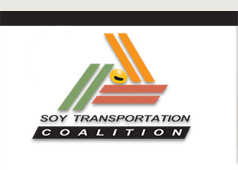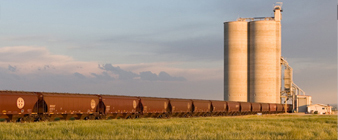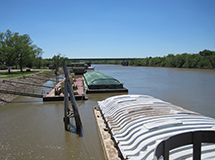 |
 |
|
| eNews • December 2012 | ||
| Promoting a Cost-Effective, Reliable and Competitive Transportation System |
||
 Barges not offered in central Midwest mid-Dec. to March
Barges not offered in central Midwest mid-Dec. to March
Some freight companies have pulled their barges from the mid-Mississippi and Illinois Rivers until March as low water after a severe drought disrupted business during the peak of the grain export season.
Some grain terminals along the Mississippi River have stopped selling soybeans to exporters at the U.S. Gulf for fear of not being able to deliver the cargoes because of critically low water levels between St. Louis and Cairo, Illinois.
With barge traffic stricken along the Mississippi River, upon which some $7 billion worth of commodities would be ferried over the next two months, grain companies are increasingly turning to rail cars to transport their cargoes to the Gulf Coast for shipment across the world.
After devastating the corn and soybean crops this year, the worst drought in half a century is playing havoc with grain shipments at a time when millions of tonnes of soybeans are being sent to overseas buyers each week.
The situation has been made worse by a decision to reduce the amount of water that flows into the Mississippi River from the Missouri River, prompting governors, senators and shipping groups to appeal to President Barack Obama.
"There's no reason to trade freight until you're sure you can move it, so they are hesitant to go sell anything more," said a freight broker, referring to barge companies.
"The last thing they want is to load something on the Illinois or in St. Louis and not be able to get it moved," he said, declining to be named because he does business with these barge companies.
RECEDING MISSISSIPPI
The Mississippi River at St. Louis is forecast to drop to near-record lows by the end of this month.
Barge carriers have already restricted the amount of cargo that can be loaded on vessels transiting the 200-mile problem area between St. Louis and Cairo.
A grain elevator in Davenport, Iowa, was loading its final cargo of the season last week, a few weeks earlier than normal, after barge companies limited drafts to 8 feet, down from 9 feet or more normally. Light-loading barges did not make economic sense at current prices, a grain merchant there said.
Some grain elevators along the Mississippi River have stopped selling soybeans to exporters because they were not certain of being able to ship the cargo to the U.S. Gulf Coast.
"We will continue to buy from farmers so long as we have storage space. But we are not selling any now," said a dealer at one of the elevators who declined to be named.
The limited shipment of grains, particularly soybeans, and the use of higher-priced rail cars to ship them to the U.S. Gulf have begun to raise export prices. Some traders are concerned that U.S. exports could become uncompetitive.
"The industry has no choice but to start planning for water levels as such that we won't be able to navigate with the kind of tow boats that we have or the drafts that we need," said Rick Calhoun, president of Cargo Carriers, a barge line owned by agribusiness giant Cargill Inc.
"We have a lot of tows southbound now. We went up there (north of Cairo) in anticipation of a potential closing as we tried to pre-position stocks for export sales and get as much of it beyond the potentially affected area as possible."
Barges were offered at St. Louis and on the Illinois River this week and next week, but the next available offers currently were for March delivery, and those offers were very thin, a barge broker said.
Ingram Barge Co, the largest U.S. barge line, has not pulled any of its offers, but was restricting drafts on any vessels that would pass through the low water areas later this month, said Dave O'Loughlin, vice president of customer service.
Ingram was planning to move into place lighter-draft tow boats from other river segments to continue navigation as the Mississippi continues to recede, but even its lightest draft vessels - only five or six of Ingram's 150-boat fleet - would be sidelined if drafts are restricted to less than 7-1/2 feet.
EXPORT UNCERTAINTY
The restrictions will likely hurt exporter margins as they are forced to turn to less cost-efficient modes of shipping grain to the Gulf, and future sales may be curbed if river problems persist.
"Our other modes of transportation, trucking and rail, don't have the capacity to absorb everything that is transported by the inland waterway system," Mike Steenhoek, executive director of the Soy Transportation Coalition.
"For the soybean industry, 80 percent of exports occur from September to February ... If you have a disruption in the supply chain at this time of year, for our industry, it's analogous to a supply chain disruption for retailers prior to Christmas."
Exporters have already raised prices for soybean shipments from the Gulf and some have been hesitant to post offers for deferred shipments amid the uncertainty.
"People are being very careful about offering deferred grain out of the Gulf unless they know where they can (source) the supply," said Cargill's Calhoun.
"You don't want to sell something that you can't source so we are at a point where if the river does shut down it's certainly our belief that we will reduce exports out of the United States."
Source: Reuters
Soy Transportation Coalition |
|
